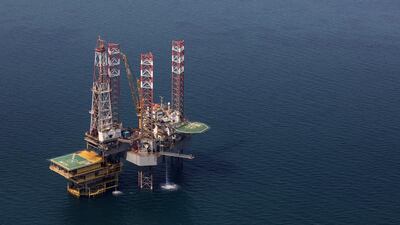Saudi Arabia, the world's biggest oil exporter, announced on Wednesday a slight upward revision in its oil and gas reserves in its first public audit of the hydrocarbon deposits.
The kingdom's total oil reserves, including those in a zone shared with Kuwait, are up 0.8 per cent to 268.5 billion barrels for the figures recorded at the end of December 2017, Saudi Aramco said in a statement on Wednesday. Total gas reserves, including those in the shared zone, were revised up 5.6 per cent to 325.1 trillion standard cubic feet, the company added.
“This certification underscores why every barrel we produce is the most profitable in the world, and why we believe Saudi Aramco is the world’s most valuable company and indeed the world’s most important," Saudi energy minister Khalid Al Falih said.
State-owned Saudi Aramco’s concession area oil reserves are 2.2 billion barrels higher or 263.2 billion barrels of oil and 319.5 trillion standard cubic feet of gas out of the total, the statement added.
"The upward revisions to Saudi's reserve figures, whilst at face value appear negligible, are a testament to the sheer scale and magnitude of the kingdom's proven volume holdings," said Ehsan Khoman, head of Mena research and strategy at Japan's MUFG bank.
The uptick in Saudi Aramco's reserves bodes well for plans to sell a 5 per cent stake in the world's biggest oil producing company, which was delayed this year to allow the firm to grow its petrochemicals portfolio and get ready for a public flotation.
__________
Read more:
UAE energy minister says 1.2 million barrel-per-day cut is enough to balance markets
Oil Watchers See $70 a Barrel in 2019 as Recession Fears Fade
__________
Saudi Arabia’s first independent audit of its reserves, which was conducted by consultants DeGolyer & MacNaughton, comes at a time when the kingdom is undertaking plans to further develop its energy sector.
Aramco plans to boost its refining capacity to between 8 million and 10 million barrels per day, from the current level of about 5 million bpd, and double its petrochemicals production by 2030.
Alongside plans to add more value from each barrel of oil produced, the kingdom is undertaking an economic overhaul that includes the initial public offering of Saudi Aramco on the local and a yet undecided international stock exchange.
Saudi Arabia’s crown prince Mohammed bin Salman, the driving force behind the kingdom's economic overhaul, told Bloomberg in October the IPO will take place by 2021, valuing the company at around $2 trillion (Dh7.34tn).
The audit did not include unconventional reserves discovered by Aramco.
“D&M’s evaluation was limited to ‘booked” oil and gas resources in the Saudi Aramco’s concession area and does not cover other available hydrocarbon resources in the Kingdom, such as the significant unconventional gas reserves recently discovered but not yet 'booked' by Saudi Aramco or the kingdom,” Aramco said in the statement. “Nor did the D&M cover the kingdom’s share of the reserves in the Saudi–Kuwaiti Partitioned Zone, which has both an onshore and offshore component.”
Currently, Saudi Arabia is part of Opec+, an alliance that includes the exporters group and countries led by Russia who agreed to trim their collective output by 1.2 million bpd starting this month. The cuts agreed in a December meeting are aimed at lowering oil inventories to their five-year average to rebalance a market awash with US shale oil.
The kingdom lowered its production by 420,000 bpd to 10.65 million bpd in December after pumping more than 11 million bpd in November, according to a Bloomberg survey.
"Yes, this increases likelihood of higher future production, as expected," Spencer Welch, oil markets and downstream director at London-based IHS Markit, said. "In last few months Saudi has broken production record several times and spare capacity has been very low, it is not surprising they have been doing drilling to raise reserves and increase spare capacity again."
US oil production last year outpaced that of Saudi Arabia and Russia, thanks to rising shale oil output.
“More crucially and of near-term importance, will be how Saudi Arabia navigates its oil strategy in line with the latest round of Opec+ production cuts in 2019 against inexorable US oil production growth that continues to surpass markets expectations,” said Mr Khoman.

